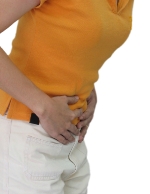IBS Diet

Soluble fiber is the best dietary aid for preventing and treating Irritable Bowel Syndrome. Soluble fiber is found in foods we usually think of as starches. The enzymes in your stomach can’t digest soluble fiber so it has no caloric effect and passes through your system.
The benefits of soluble fiber are based on the fact that soluble fiber soothes and regulates the digestive tract and prevents stomach spasms. It also regulates bowel function preventing both diarrhea and constipation. It is the only substance that works in this manner. The fibers dissolve in water even though they cannot be digested. The dissolved soluble fiber absorbs excess liquid in the digestive tract and forms a gel. This gel keeps the colon full and gives the muscles something to grip preventing rapid watery movements. It also softens any impacted or hard fecal matter and helps it move through the colon more quickly and easily.
Normalizing colon contractions prevents the gastrocolic reflexes associated with IBS. It relieves the pain and spasm episodes that plague IBS patients.
The IBS sufferer should never eat anything but soluble fiber on an empty stomach. It should be eaten regularly throughout the day to prevent the painful spasms associated with IBS. If this is not possible there are a number of good commercial soluble fiber products on the market. Remember absolutely no insoluble fiber on an empty stomach and eat with care all of the time.
Rice, pasta and noodles, oatmeal, barley, white bread, soy, quinoa, and cornmeal contain the easiest and most useable soluble fibers for snacks and meals. The bread should be white, baked daily, and of good quality with no preservatives.
Potatoes, carrots, yams, sweet potatoes, turnips, rutabagas, beets, squash, pumpkin, mushrooms, chestnuts, bananas, applesauce, and mangos also fall in this category. Avocados have soluble fibers but they also have some fat and papayas have soluble fibers plus the added advantage of digestive aids.
Insoluble fiber foods must be eaten with care. They are necessary to a healthy diet and are some of the best tasting foods but they must be eaten with caution and prudence.
In general, if a plant seems stringy, rough, or has tough skin, hulls, seeds, peel, or pods it is likely to be high in insoluble fiber. Animal products do not contain fiber.
Whole grains, granola, seeds, nuts, popcorn, beans, berries, cherries, pineapple, dried fruit, peaches, nectarines, apricots, pears, unpeeled apples, rhubarb, melons, citrus fruits, cruciferous vegetables, greens, whole peas, corn, peppers, eggplant, celery, onions, leeks shallots, garlic, tomatoes, cucumbers, sprouts, and herbs are nutritious but insoluble fiber foods. Use as much as you can without discomfort but use with care and never on an empty stomach.
When incorporating insoluble fiber into your diet remove the most offending parts if possible such as skins, seeds, or fibrous materials. Start small and increase amounts until you know what your tolerance limits are.
Some fruits and vegetables are extra troublesome for those with IBS. The foods include sulfur containing and cruciferous vegetables, vinegar, acidic foods, and fructose. Fructose is the sugar found in fruits and honey. It is also added to many foods. For this reason, drink fruit juices with care and watch labels for fructose.
There can be a number of foods that may act as trigger foods. They are often unique to the individual and one way to isolate them is to keep a journal for a while and record all foods to pinpoint when problems occur. Another way is to eliminate all possible triggers and add items back one at a time to ascertain which ones affect you.
Lactose intolerance can be a problem for some IBS sufferers. Others have trouble with foods that cause flatulence, meats, or sugars.
Remember to eat soluble fiber to soothe and relax your digestive system, use insoluble fiber with care, and avoid any foods that you know to be trigger foods for you. Never eat anything but soluble fiber on an empty stomach. For good health, try to work in as many insoluble fiber foods as possible without causing discomfort. Only totally avoids things, which you know to be trigger foods for you.
